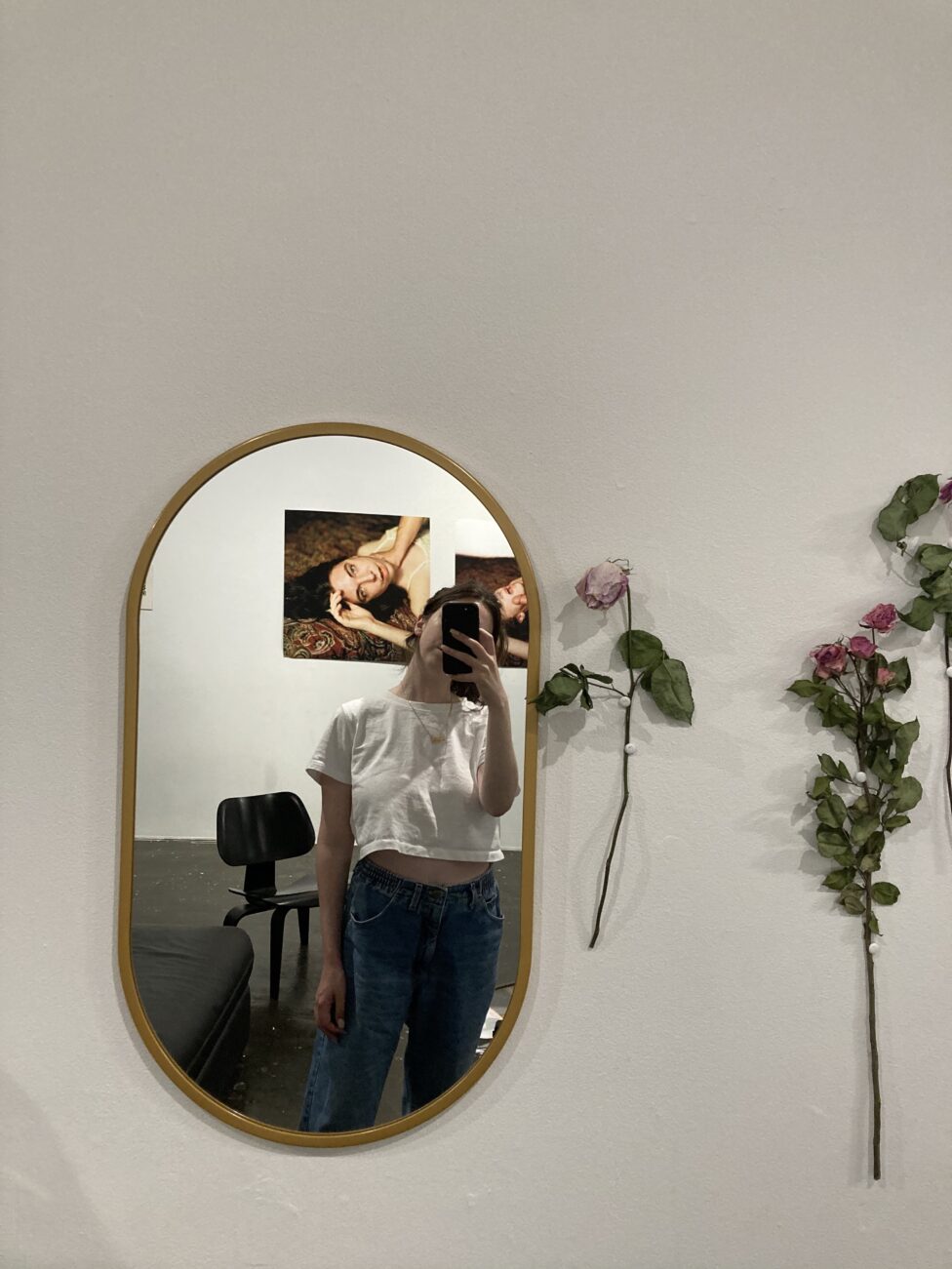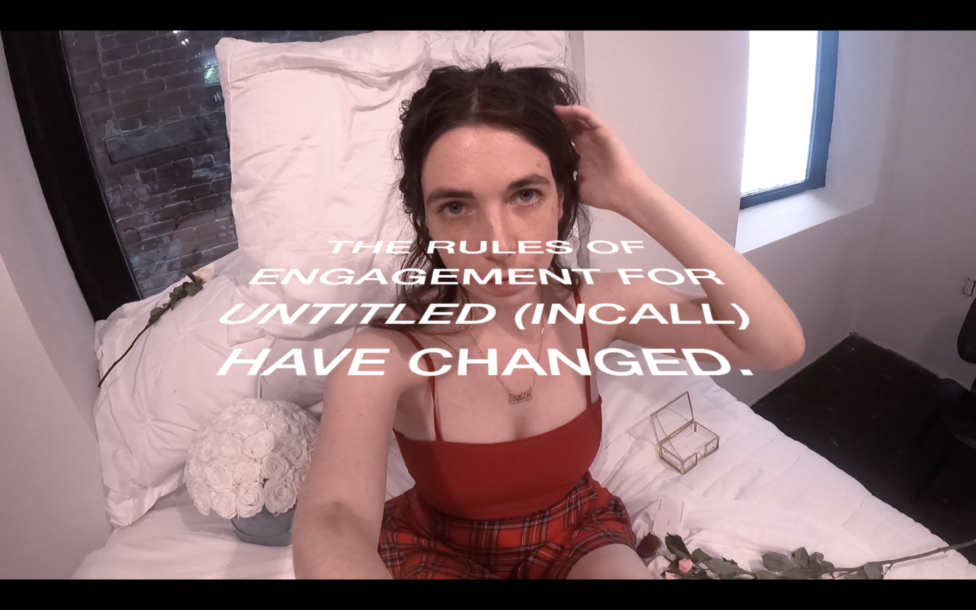Sophia Giovannitti: It was really clear to me that a lot of people were confused about what was going to happen when they came to the space, and maybe wanted to have sex with me or something—or didn’t want to, and didn’t know if that was expected to happen. But what I felt like ended up happening often in place of something physical was something very intimate, like people wanting to expose some part of themselves by having these intense talks about things related to sex or sexuality. I’m happy for the experiences that I had. The people who came were really sweet. In the beginning, the people who came were more friends of friends, or people that I actually felt like I was interested in talking to. But even so, I thought, this will get exhausting to do over the span of several weeks if I’m not really making any money off of it.
Then I realized that there were definitely people who were contacting me through Signal who had found me on ad sites. They clearly wanted to hire me but thought, through some kind of loophole, they could come to this space and see me for free. People would be like, “Is this a real incall visit?” No, not if there’s no financial exchange, but people can just have conversations with me. And then somebody said, “Okay well I can’t pay you, so I’m happy to just come and have a conversation with you.”
And then that was when I was like, I’m changing what’s happening, and no one can interact with me here for free anymore, because it was very clear to me that this person knows that there could be another universe where if he had the money he could fuck me, and wants to, so talking with me, while knowing that, will be a sexual experience for him that he will get off on. And then that will feel like something’s being taken from me.
Sarah Michelson: I was trying to think back to when we spoke the first time when I came to see Untitled (Incall). I remember we talked for a while after. I remember having a curiosity, or feeling protective about how your body passes through this transactional work. You were talking about actually being able to really physically separate those experiences. I remember of the things that I felt like I did understand by the end, but will not be able to articulate now, was this way in which the idea of you as an artist and the art world and the transactional procedures within that, aligned with the fact that many artists use sex work as an income support system. The fact that the transactions of the art world themselves fetishize the artists and disregard them in a way that one might think of as stereotypical sex work.
Your embodiment and the space itself is sort of revealing all the transaction points, the pipeline, the eternal survival circuits of economies, ecologies, and biologies. Yet, it occurs to me that you being so personally available—having this sort of unstructured access to yourself—does not potentially help illuminate that circuitry. There’s a lack of clarity… I mean, of course there’s clarity in terms of how everything works.
SG: Exactly, and that this opaque thing is totally contrary to my point. Before I changed the conditions, all this unspoken work and access to me personally is happening, and all these desires are remaining really unclear and under the surface. There’s some kind of erotic exchange yet nothing financial is happening. Also some people were like, “should I offer you something?” And it was mirroring what I think the issues are in these worlds. And that also made me think about how powerful and dominating the conditions are that keep all these things opaque and fueling each other; existing as these points of labor and financial exchanges and stuff. It’s so interesting to me that even in a nonprofit art space, where I literally set out to do this piece that would illuminate what we’re talking about, I somehow still initially recreated those structures. It’s so foreign to have these things on the table when everyone feels so uncomfortable asserting their role in it. All the structures in place are just reinforcing the shrouded exchange economy that no one’s talking about.
SM: As you were talking, I was for some reason thinking about when I first moved from Manchester (UK) to San Francisco, and a bunch of my friends were sex workers at peep shows. So I was thinking, okay, this is not a peep show. But this also is kind of a peep show. It’s like a peep show to the interior of you as a sex worker, as a way to embody these pipelines. A San Francisco peep show is a peep show that is really based on the peepers, and the structure is very basic and very clearly in place. This much money, it’s this long. It’s like a circus: opening, dancing, the body but the exterior. So if this is a peep show to the interior, like a mapping via attraction or desire, if that’s the case, then what about the system or the pipeline—illuminating, platforming it, embodying it?
What would it have been like, for example, if you had another person here? A PERSON who is basically a gateway. What would it be like if there was an intermediary person, who would be within the space, holistic in the space, but would demand a building of what the transaction would be? And the transaction wouldn’t happen that day. So you would be present, and then there’ll be a building of the transaction, as a repositioning of how it might all take place. The authorship would come from the clients with your approval and with a mediator, someone who’s building it, who says “You can do this, and you can’t do this.” And everything is possible, and the transaction is created and signed, then it happens seven days later. And I know that’s very “un-freeform,” but it puts pressure on the client to publicly, in intimate space, build their transaction. And if they say, “I want to know about all of Sophia’s personal family life,” then we can speak to that. Is that available? At what cost? Maybe that’s the most expensive thing on the menu.
Making the transaction could be super fun because you can go off script, for seven minutes, and when you buy those, you can pay after. At this moment, it’ll cost you this many dollars. You can have up to five, but they cost this much.
SG: It’s so important for clients, consumers, and people to figure out and think through what they want. With somebody not acknowledging or embodying their own desires, particularly in any kind of erotic context, what often ends up happening is that they’re just demanding with no awareness of what they’re demanding. That’s actually what feels bad. I think there are instances where I could be available for so many different kinds of requests. And maybe this is a personal thing, but I think it’s somewhat universal: I hate being asked to do things, if what is being asked of me is not acknowledged.

photo by Gia Sergovich,
ID: A neatly-made white bed is positioned against the white wall. The white blanket has a lot of wrinkles with some rose leaves scattered on top.
SG: We were talking about Andrea Fraser’s version of this and how I’ve been feeling a lot of empathy for what I read her saying, which is that she was really traumatized by having this particular number [$20,000, reported incorrectly at the time of the sale of her performance-video] or monetary value attached to her within the art world. She called it being exposed as “cheap,” which I understand, and especially given that she did a version where there was an intermediary: her gallerist organized the sale. You said something about how, in doing this, and not creating proof for the institution I’m working with, they can’t take anything, at least financially, from me. I could leave here whole and fully intact in a way that maybe wouldn’t work in a commercial space. And now I’ve just been trying to work and think through that because there’s a part of me that wants to do this in a commercial space, or a space where the framework of having an intermediary who negotiates the sale is present. But now you’re making me think also that there’s so many other ways to do that.
SM: With Andrea Fraser, that intermediary was not an intermediary, that intermediary was like a front face of the proposition, like the salesperson. So I guess I still want you to have this work unfold and be your teacher in a space that is not extractive. So that you are able to have the full range of experience and really know that what happened here is what you built and what you embodied. And I feel like that’s crucial to the growth of you and your work as it rolls out. That’s very tangible to me. This space is a space that you can build to. To push forward, somehow put yourself out there into a space that grapples with all the parts of you: your intellect, your relation to art, your practice, your relationship to sex work, your own interest in it, the private, the public, the body, all your sensitivities. And your ability to manage all of those in relationship to currency. The fact that this has been soft with internal problems that you’ve been able to shift your relationship speaks to your physical presence growing. Because you felt like right now, this is not transactional in a clear way, this is not illuminating. It’s actually illuminating that the transaction is in relationship to my effort, and it’s like you had this Andrea Fraser model, you had your own sex work, and you have your own artistry. And then it was like a knot of wool, and you’re just undoing it in order to build traction in points of view and interactions.
SG: I locate myself and who I am so much more in my mind life. And I like my body fine, I certainly relate to my body, but I think that the things that feel invasive or intrusive or violating are often things that are said to me.
SM: When you think about the things that are said to you that have been most violating or feel violatory, how do you remember them?
SG: I remember them with my body.
I have a stronger physical response to things that are said to me rather than being touched. I can have a physical experience where it’s unpleasant but my mind’s not fully there, and then I can just kind of let it go. One of the most repulsive experiences I’ve ever had was when I met this person who was maybe going to be a client for a drink in a hotel lobby as a type of screening to see if I would take them on as a client. And nothing physical happened. We probably sat six inches apart, and I was probably there for like 30 minutes. He was looking at me and then he sort of described me back to me. And then he used the word nubile, and it was so disgusting. I don’t really know why, but the way that he said it, it just felt so violating. It makes me nauseous when I think about it.
And so many other things have happened, that are worse or were physical or whatever, but that I never think about and have literally forgotten. And as we’re talking about this, I think it would be so interesting to do this piece again, to do it in different places and to change it. I think that actually it would feel so much better and be so much more interesting to say “these are these conditions to engage with me in this space, and let’s say for argument’s sake that this piece is up for four weeks, and if no one meets those conditions, no one engages.”
SM: At a commercial gallery, maybe it’s not free, but it’s like half price or whatever might be negotiated, I guess. The gallery pays you, you still get paid. So then also the work is split between you and the gallery or whatever that would be, and then some people don’t want to do that. And then they just pay the full fee directly to you because they don’t want it to be saleable work. So I think that could be a way in which the person who can’t afford it, there’s a system to handle that by which you still get paid. I’m not saying that this is the greatest idea, but what I do think it does is in the intake and then in the wider setup, I guess I want to say it’s more under the hood of the pipelines, it’s like all these choices the consumer can make, and if you record the stats of those and everything, it starts to show how the money flows, what the conditions are, what the consumer wants, and then what do you receive, and then with a gallery present, it just starts to make those pipelines active but unlike Andrea Fraser, the gallery is not stepping in as your intermediary. It’s really important that that’s not a gallery person, that’s another artist.
SG: Yeah. I wrote this sort of like manifesto that was part of my book proposal that was basically saying I want the distinction between the art and sex industries to collapse. I want collectors who are buying sex from young artists to acknowledge this as valuable, as artwork. In giving someone a blowjob, then the idea of that or like the paper transaction or whatever, can appreciate in value and then the artist doing that sale can sell their work for more as it appreciates in value.
But I was talking to someone recently about how all the money in the art world is so dirty and has always been. And now in the past few years, there’s a constant call to action. Like right now people are striking MoMA, what happened at the Whitney Biennial… the art world is totally of course funded by evil ways of making money. And it’s interesting because sex workers who are charging a lot of money are interacting with the same people who have really “dirty” money.
SM: Also that it’s interpersonal. So there’s also personal preference and stuff involved.
SG: It just made me think about how you can’t have it both ways. If the artwork appreciates in value—it made me realize I would feel so differently if somebody was buying some form of sex from me, and that person was a collector. And they owned this performance, and what they owned was a certificate of whatever edition of the performance, if that became then something that they could resell, that would appreciate in value. Yes, my value would go up, and I could sell stuff for more. But at that point, they also would be making money off of me, which doesn’t happen currently. And I would feel so differently about that. Do I really want this?
SM: It could be a long-term lease. I guess I feel like I wonder in this embodied pipeline, where those discarded wives are.
SG: Oh, absolutely.
SM: Also like, what’s driving sex work? In the gendered version of it. I guess it’s ego related, you know, as we said before I’m throwing down my car key, I’m throwing down my wallet.
SG: Right, those embodied actions that reflect back to yourself who you are, what kind of man you see yourself as.The way these gendered gestures build our selves for our selves: I’m okay. This is what I’m doing, this is who I am.
SM: “This is who I am,” yeah. And how does the infrastructure of desire and sex work and the body messaging that is so um, “socio-bio” or whatever (I make up these terms). You know what I mean, “socio-bio?” How did Andrea Fraser do zero, for example? Maybe less than zero in that regard? I’m sorry that you feel cheap, I feel a lot cheaper [laughter].
SG: [laughter] Exactly, yeah. Going back a little bit to something that you were saying a minute ago about seeking reassurance, and the work being really narrative. This is sort of like throwing down the car keys, right? I’m embodying this work one way, and then the client is like, seeking the services of a sex worker for his own embodied reasons.
SM: So when we’re talking about the industry, and the circulation of money. And I’m talking about the intellectual way we picture what one looks like, how one comports. The wallet, the keys, a socio-bio, kind of messaging. But beyond that, like when someone says something to you how you heard it, how you felt viewed and spoken to, and how that went into your system to be like an anchor trigger. That is, I guess, continues to be an unpacker of your relationship to the work you’re doing as a guide, in a way?
SG: Yeah [laughter].
SM: And as you say, that’s very interesting, that that wasn’t being touched. Yes. But then I want to say, but it was, right?
SG: Yes.
SM: Money is big, basically the promissory of biological desire. It’s the voucher.
SG: Yeah, it’s the voucher [laughter]. To be honest, a lot of this is an experiment for me. What are ways that we add financial value to bodies, in the sex work world? It’s common for people to get plastic surgeries, but also beyond surgical modifications, it’s like everyone has fillers and Botox and all these like age defying things, because obviously it’s in.

photo by Sophia Giovannitti
ID: Mirror selfie of Sophia in the reading room area of Untitled (Incall), showing decor of dried roses and pornographic self-portraits.
SM: It’s a young girl sport, right?
SG: It’s a young girl sport. Actually, there are people I know who are really successful, and might be older than you think, but are paying a lot of money to look younger, or what signifies to the consumer as young. And I have no problem with that at all, obviously, it’s a great way to keep charging more. But we already know that’s a successful mode through which to attach value to yourself, and so now I’m curious, if I attach our institutions that signify money to my body, will that add as much value as if I straightened my teeth and blew out my hair every day?
SM: Yes. I feel like that was very synthesized. An extremely synthesized value of the person.
SG: Also, something I’m so curious about with your work is how you have felt using your body within all of these institutions. It’s a different kind of bodywork. But still people are profiting off of your body. You’re profiting off your body. I’m really curious what that’s been like for you.
SM: I’ve always been sort of driven, and ambitious, but also, whatever. I’ve never had a press pack or a website and all this stuff. But even so, I’ve been in scenarios and institutions that pushed me to succeed on my terms. That put a lot of pressure on me, and often on my dancers, the people working with me. And if I had my time over, if I could do that again, yeah. I would do it differently.
SG: How would you do it differently?
SM: I know so much more now about how the pressure of being able to have a platform on which you can work drives artists to succeed in relationship to institutions. I don’t think I was influenced in terms of the kind of work I’m making. I definitely have always felt that what’s coming out of me, is what’s happening. But I do feel that I allowed myself to feel pressured from the system to be recognized or seen for my efforts. And I do think that that often felt quite desperate at the moment. And I think I was led to believe and allow myself to believe or perceive, based on my own trauma, that that was part of how one produces work, that’s part of it. Like the fear when the show’s going up and up, and I hear curators and galleries and stuff talk about “what do you think?” I realized what baloney that is. What fucking baloney that is.
SG: Yeah, it’s so manufactured.
SM: It’s so fucking stupid. Maybe it has forced me…and when I say force I mean like sausage meat force…It skinbags you under pressure to produce through the eye of the needle what might be work that you wouldn’t have manifested in that way if it wasn’t forced. I would resist that now. And I would say, get off me and all of us here. And actually, it’s fine if our work isn’t finished. It will never be finished. You will, at very least. We’re not producing shows on Broadway so let’s just get that fucking out of the way right now [laughter]. Alright, it’s not a produced show, it isn’t produced. It should be interfaced with practice and thinking practice and embodied practice. And that’s fucking it. So I would do that differently.
SG: But within that though, it’s so interesting to hear you say that you felt that you have to submit to these pressures because I feel like you successfully resisted so much pressure.
SM: Yes, totally.
SG: And then how did you feel empowered to do that or know that?
SM: You need to know. I felt empowered to do it. There were two moments of that. One,in the younger part of my career when I was working with my friends, and something would look like shit and I’d be like, oh fuck that looks like shit. And my friend would just be like “I don’t know about you but do you just want to leave it like that?” [laughter]. She basically got me wanting to impress her more than I wanted to impress the institution. She needed me to make sure that I had my intentions manifest to the best of our ability. So she taught me to do that. Then I was practiced at it.
And then the second part is: I can’t. It’s like, if I can’t be in the space, if I can’t have space to work, if I can’t know the constituencies of the space before I’m working, then, physically, I won’t. I won’t show up. I can’t do it.
SG: Yeah, totally.
SM: Honestly, I feel like I didn’t get all this way from my traumatic life in Manchester to here, to not actually follow the thing that got me here. I have to honor that.
SG: No, what you just said also was such a distillation of what we’ve been talking about. It’s like I want to go forward with letting myself really know and say, it is this way, or it isn’t.
SM: There must be a possible way to do it; maybe the consumer has to state their income range or something. Maybe just ask him what’s his zip code. Right?
SG: Oh, that’s so good [laughter]. It’s legible that way. As soon as you put any other kind of number on yourself, everyone has an opinion on it. I love when escorts don’t list their rates on a website. If you know my rate, that’s already something that you know about me.
SM: Yeah are you Gap, J Crew, Banana Republic, you know what I mean? What are you, Anthropology?
SG: Exactly [laughter].
SM: I keep talking about this transaction idea not at all because I think you should do it, but for the sake of this discussion, it’s also about the client. Like, what are they walking in with? The pricing reflects as their mirror basically, as you see it in building the transaction. So that they feel that they’re spending the right amount of money.
SG: I like the idea of making the transaction the site of the art piece and what can be recorded and resold because ultimately that moment is what is criminalized, and also a moment of hypervisibility.
SM: There’s many things you could say when you have to give, like proof of ID, and you can check however many things off this list.
SG: Yeah!
SM: Like a point system. “You need three ten-points, zip codes worth three, what kind of car do you drive, or who’s your—”
SG: I love that [laughter]. Like “what kind of watch are you wearing?”
SM: Exactly. And after you answer, the mirror transactions start to emerge.
Cover Image Description:
Sophia, a white woman with dark hair and blue eyes, looks up to the viewer on a bed surrounded by business cards and roses. The text “The Rules of Engagement Have Changed,” is overlaid the image at a vertical distortion.






